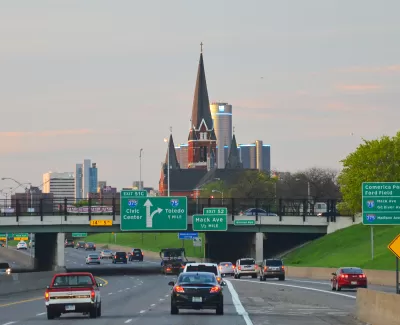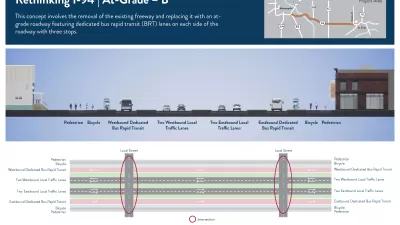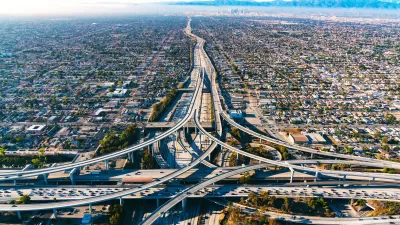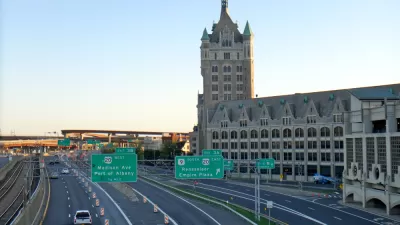A decade-old plan to elevate a below-grade segment of Interstate 375 and replace it with a lower-speed boulevard could begin two years ahead of schedule thanks to USDOT funding.

Detroit’s plan to remove a portion of the I-375 freeway received a boost from the federal government with a $104 million grant from the U.S. Department of Transportation, part of a broader federal endeavor to remedy the impacts of freeways and urban renewal on neighborhoods around the country. Notably, the grant was not awarded from the Reconnecting Communities Act, but from USDOT’s Infrastructure for Rebuilding America program.
According to a Detroit News article by Melissa Nann Burke and Riley Beggin, “The grant is a significant boon for the proposal, which dates to 2013 and envisions a walkable, leafy concourse integrated with the community and lined with shops, restaurants, homes and pedestrians on the eastern of edge of downtown Detroit.”
The effort is expected to cost $300 million and be completed by 2030. “The project, which already has environmental approvals from the Federal Highway Administration, would raise the roadway by 20 feet to street level, integrate it with cross-streets and landscape a boulevard past Jefferson Avenue down to Atwater Street.”
The freeway removal encompasses other projects including traffic calming measures, the removal of fifteen bridges, and new signalized crosswalks and bike lanes.
FULL STORY: Michigan gets $105M grant from feds to turn I-375 in Detroit into boulevard

Manufactured Crisis: Losing the Nation’s Largest Source of Unsubsidized Affordable Housing
Manufactured housing communities have long been an affordable housing option for millions of people living in the U.S., but that affordability is disappearing rapidly. How did we get here?

Americans May Be Stuck — But Why?
Americans are moving a lot less than they once did, and that is a problem. While Yoni Applebaum, in his highly-publicized article Stuck, gets the reasons badly wrong, it's still important to ask: why are we moving so much less than before?

Research Shows More Roads = More Driving
A national study shows, once again, that increasing road supply induces additional vehicle travel, particularly over the long run.

Judge Halts Enforcement of Anti-Homeless Laws in Grants Pass
The Oregon city will be barred from enforcing two ordinances that prosecute unhoused residents until it increases capacity and accessibility at designated camping sites.

Advancing Sustainability in Los Angeles County Schools
The Los Angeles County Office of Education’s Green Schools Symposium brings together educators, students, and experts to advance sustainability in schools through innovative design, climate resilience strategies, and collaborative learning.

Using Old Oil and Gas Wells for Green Energy Storage
Penn State researchers have found that repurposing abandoned oil and gas wells for geothermal-assisted compressed-air energy storage can boost efficiency, reduce environmental risks, and support clean energy and job transitions.
Urban Design for Planners 1: Software Tools
This six-course series explores essential urban design concepts using open source software and equips planners with the tools they need to participate fully in the urban design process.
Planning for Universal Design
Learn the tools for implementing Universal Design in planning regulations.
City of Moreno Valley
Institute for Housing and Urban Development Studies (IHS)
City of Grandview
Harvard GSD Executive Education
NYU Wagner Graduate School of Public Service
City of Cambridge, Maryland
Newport County Development Council: Connect Greater Newport





























